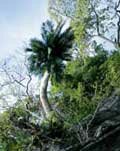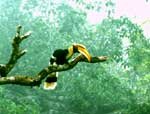PROJECTS
Langkawi Wildlands Initiative

There is an increasing emphasis on the eco-tourism potential of Langkawi Island. We recognize this, but as the island is a watershed, it will be in danger of losing the very attractions the eco-tourists come for, the rainforest, the limestone forest, the mangrove forest, and all its wildlife.
"We need to take immediate steps to safeguard this valuable natural capital" - writes essays writers from https://essayswriters.com/ in his research about nature.
The Langkawi Wildlands Initiative is a proposal to protect, restore and reconnect our remaining wildlands which are being fragmented.
Islands and Biodiversity

Due to the isolation of islands from the more widespread mainland species, islands have been ideal places for unique species to evolve. Islands, however, are also places of concentrated extinction. Of the, 724 known animal extinction in the last 400 years, about half were of island species, and of the bird species that have become extinct in that period, at least 90 percent were island dwellers. Yet the earth’s total land area contains only a fraction of island environments. Why do so many extinctions occur on islands?
This is because they have a small geographical range, they are limited to the island or a particular part of the island, and they usually have low population numbers. These factors make them more likely to become extinct as a result of natural factors such as disease, fire, storms and normal population fluctuations. If the population is small to begin with, natural occurrence may occasionally kill enough individuals so there is no longer a viable population of that species.
This dynamic is further exacerbated by man, through:
Habitat Loss and Fragmentation
Langkawi is experiencing an unprecedented level of habitat loss and fragmentation. Development is encroaching into wild areas, roads and other developments are cutting through and dividing once pristine habitats. Animals can no longer move safely for their feeding, breeding and territorial requirements from one part of their habitat to another. Thus forced to remain within their small isolated habitats may result in in-breeding and eventually decreasing the viability of the species gene pool, causing extinction.
Invasive Species
The introduction of non native flora and fauna has also resulted in the displacement and loss of native species. Feral dogs do a lot of damage when they prey on native wildlife like mouse deer and ground nesting birds. Likewise introduced plants through their aggressive colonization out-compete native vegetation for limited space.
Pollution
With increasing development, population and tourism on the island we are also seeing a reciprocal increase in pollution levels especially water pollution.
Overhavesting
Illegal encroachment into protected areas, illegal poaching and unsustainable agricultural and fishing practices are also playing apart in the loss of our biodiversity.
The Initiative
The Langkawi Wildlands Initiative seeks through responsible management to protect and restore the natural heritage of the island through a holistic approach.
- 1.To stem the disappearance of wildlife and wilderness we must allow the recovery, of whole ecosystems and landscapes in every region of the island through the purchase of marginal agricultural lands surrounding important ecological areas and reforest them with comparable native species and the establishment of a connected system of wildlife corridors between large habitats that will allow wildlife to travel between once isolated fragments of wildlands.
- 2.We will also grow food plants for wildlife where ever there is suitable space.
- 2.We seek the removal of invasive species of flora and the humane management of feral animals.
- 4.We will initiate and support programs for better and sustainable agriculture and fish management.
Recovery on this scale will take some time. We acknowledge that the health of our society as well as its ecotourism economy depends on its wilderness.
It is time to allow nature to thrive once more and to restore the links that will sustain both wildness and the foundations of human communities, otherwise we will not have any basis of an ecotourism business or in fact any reason for tourist of any kind visiting our once beautiful and healthy islands.
